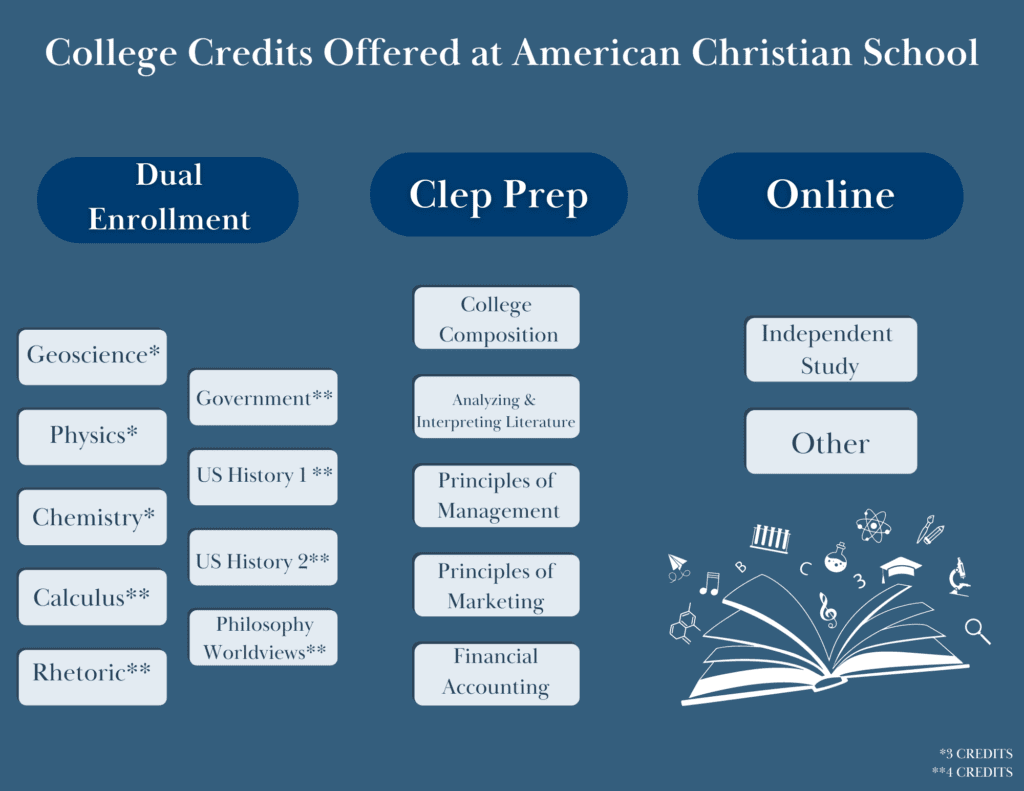Dual Enrollment


Dual Enrollment (DE) allows students to take a college course while still attending high school. The credits for the course will count toward high school graduation, but more exciting, most colleges will also accept the credits. So a student could take a dual enrollment chemistry course in high school and the college they attend after high school graduation will accept the course and credits as completed when the student enrolls in their school.
At this time, the majority of colleges and universities accept dual enrollment. The greatest exception is the ‘Ivy’ League schools; however they look upon applicants who have taken such classes favorably.
There are several ways to earn college credits and all have to be approved by the high school. The following sources are available for access to college credits:
On-Premise Dual Enrollment Courses – these courses are most desired by ACS as the curriculum is approved as a college course, meets our Classical curriculum requirements, is taught by one of our Masters/Doctorate level faculty and the student has direct and constant access with the teacher for support. In the past, one of the first courses available for access to dual enrollment was called ‘AP’. This company is not utilized by ACS as the curriculum and testing structure does not align with our Classical approach, but we mention it as many parents are familiar with that brand.
College Level Examination Program (CLEP) – standardized tests created and administered by the College Board. Students passing the test earn college credit for that subject but not high school credit. Anyone can sign up to take the test and there are websites available to prepare for the tests. At ACS we have incorporated this preparation into the appropriate subject class. The entire class then is able to prepare and take the test at the testing site together. For example, preparation for the CLEP test for English Composition is taught during our English Comp. course. We have found this approach to be very effective versus having the student prepare on their own.
Online College Courses – Some online college courses are available to high school students. Upon passing, the student receives credit for the class and like the other DE courses, most universities and colleges accept those credits when the student enrolls. The courses must be approved by ACS and cannot be taken in lieu of any similar class offered at ACS.
Community College Courses – Some community college courses are available to high school students to attend in person or online. Upon passing, the student receives credit for the class and like the other DE courses, most universities and colleges accept those credits when the student enrolls. The courses must be approved by ACS and cannot be taken in lieu of any similar class offered at ACS.
All students have access to the DE program at ACS. Students with a greater focus on academics will typically complet more DE courses than others, but even one course has an impact. We have had students who have completed their entire first year of college while at ACS and some who have even obtained an Associates Degree (several courses must be taken in the summer after high school graduation per college requirements).
Benefits Include:
Saving money on every course. ACS works hard to pass on all savings to the students with the typical expense per DE course ranging from $0 to $400. Colleges speak in ‘credits’ and so the student will receive 3 or 4 college credits typically per course. Assuming an average cost of $50,000/year for private universities and $35,000 per year for state including board, the same course during freshman year would cost $5000 and $3500 respectively.
Earlier access to earnings. Students who graduate a year early get an extra year of working and the associated pay.
Academic challenges and increased learning opportunities. Freshman year of college is composed predominantly of ‘general education’ courses like public speaking, humanities, English and science. These are often redundant courses to what the student took in high school; resulting in an expensive, redundant learning experience. With DE, those courses will be considered completed by the college.
Parents and students will be notified of any class the student is enrolled in that provides DE credit, including CLEP access. A specific DE enrollment form and associated fees must be completed by the deadline to qualify. Students meet with the ACS College Guidance Counselor to plan additional online courses throughout the high school career. Parents are welcome to schedule an appointment to be a part of this college guidance planning process.
